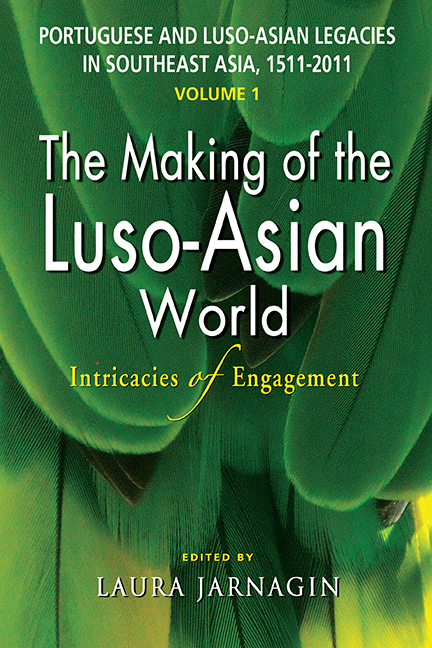 Portuguese and Luso-Asian Legacies in Southeast Asia, 1511–2011, vol. 1
Portuguese and Luso-Asian Legacies in Southeast Asia, 1511–2011, vol. 1 Book contents
- Frontmatter
- Contents
- List of Charts, Figures and Tables
- A Tribute to Glenn Ames
- Preface
- List of Contributors
- Glossary
- Introduction: Towards Clarity through Complexity
- Part One Adaptations and Transitions in the South and Southeast Asian Theatres, Sixteenth through Eighteenth Centuries
- Part Two Dispersion, Mobility and Demography from the Sixteenth into the Twenty-first Centuries
- 6 The Luso-Asians and Other Eurasians: Their Domestic and Diasporic Identities
- 7 The Population of the Portuguese Estado da Índia, 1750–1820: Sources and Demographic Trends
- 8 Flying with the Papagaio Verde (Green Parrot): An Indo-Portuguese Folkloric Motif in South and Southeast Asia
- Part Three Mixed Legacies: The Portuguese and Luso-Asians in the Twentieth and Twenty-first Centuries
- Bibliography
- Index
8 - Flying with the Papagaio Verde (Green Parrot): An Indo-Portuguese Folkloric Motif in South and Southeast Asia
from Part Two - Dispersion, Mobility and Demography from the Sixteenth into the Twenty-first Centuries
Published online by Cambridge University Press: 21 October 2015
- Frontmatter
- Contents
- List of Charts, Figures and Tables
- A Tribute to Glenn Ames
- Preface
- List of Contributors
- Glossary
- Introduction: Towards Clarity through Complexity
- Part One Adaptations and Transitions in the South and Southeast Asian Theatres, Sixteenth through Eighteenth Centuries
- Part Two Dispersion, Mobility and Demography from the Sixteenth into the Twenty-first Centuries
- 6 The Luso-Asians and Other Eurasians: Their Domestic and Diasporic Identities
- 7 The Population of the Portuguese Estado da Índia, 1750–1820: Sources and Demographic Trends
- 8 Flying with the Papagaio Verde (Green Parrot): An Indo-Portuguese Folkloric Motif in South and Southeast Asia
- Part Three Mixed Legacies: The Portuguese and Luso-Asians in the Twentieth and Twenty-first Centuries
- Bibliography
- Index
Summary
O papagaio do paco Nao falava — assobiava. Sabia bem que a verdade Nao e coisa de palavra. Fernando Pessoa
The parrot in the palace never spoke — whistled instead. It understood full well the truth's not something to be said.
The folksong “Papagaio Verde” (Green Parrot) is one of the oldest and most widely known Portuguese cantigas — stanzas of verse sung to traditional melodies — that spread from Indo-Portuguese communities to South and Southeast Asia. Sung from Diu to Macao, the papagaio verde is a popular and agile motif: it flies in from afar to teach maxims, play the rogue, criticize or insult, sing to a lover, or beat its wings and sing dance tunes. Variants of quatrains on the theme of the green parrot sung in Creole Portuguese have been collected throughout Luso-Asian communities by linguists, folklorists and ethnographers, and remain part of folk traditions performed in Daman, Malacca and Macao.
Parrots — birds of the order Psittaciformes found in Portugal and throughout the tropical and semi-tropical lands contacted by the Portuguese voyages — appear as a motif in early Portuguese folk verse and folksong. Popular seven-syllable quatrains or cantigas, collected in the field by ethnographer Jose Leite de Vasconcellos (1858–1941), invoke birds with green feathers, or green parrots, for their intelligence, playful social skills, ability to imitate the human voice and long, direct flight. In the nineteenth century, it was common to give a parrot as a gift. Brazilian statesman Joaquim Nabuco (1849–1910) favoured the English politician Charles Herbert Allen (1824–1904) with two parrots, and the recipient wrote in appreciation on 9 February 1900:
[Thank you] for so kindly bringing me another beautiful green parrot … You will be pleased to hear that the beautiful parrot has grown into a very fine bird and … is so active and lively. He still calls himself “papagaio real” but has already picked up many enough words and phrases. My two daughters are extremely devoted to him and he really comes out of the cage to sit on their hands. The grey African parrot looks on him with contempt … He is wonderfully imprudent.
- Type
- Chapter
- Information
- Portuguese and Luso-Asian Legacies in Southeast Asia, 1511–2011, vol. 1The Making of the Luso-Asian World: Intricacies of Engagement, pp. 178 - 202Publisher: ISEAS–Yusof Ishak InstitutePrint publication year: 2011


